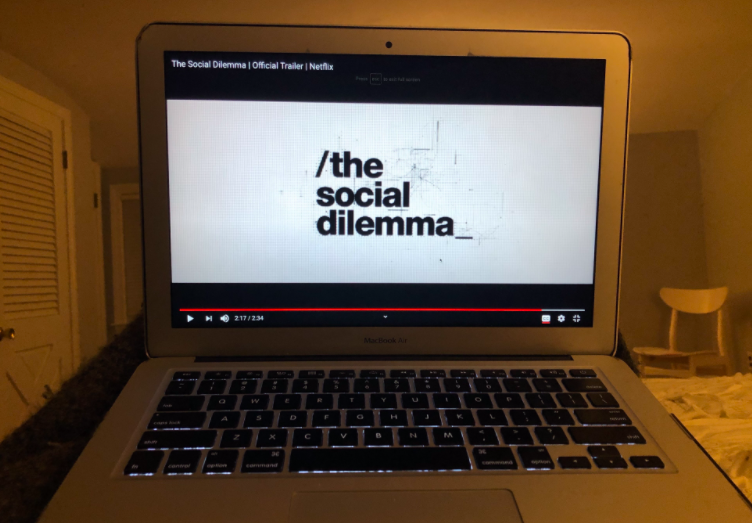Movie Review: The Social Dilemma
Credit: Julia Raymond
Student Council will hold a school-wide viewing of “The Social Dilemma,” next Wednesday, Feb. 3. There will be two viewings, one for 9th and 10th graders, and one for 11th and 12th graders.
*Warning: Spoilers of The Social Dilemma ahead*
I’m going to be honest. When I first heard of The Social Dilemma, I had no interest in watching it. I figured it would just be about screen time. But several people came to me saying they had watched it and deleted their social media apps afterward, so I gave it a shot, and now I can confidently say that it’s a good movie.
Through real-life examples, this movie instilled a great amount of fear in me about the overuse of my phone. For example, it follows a teenage boy as he slowly becomes invested in political posts. He gets a notification about a political protest going on near him which he ends up going to. The story concludes with the boy getting arrested and beaten up at the protest: a dangerous place that the media influenced him to visit. Watching this scene, I became frightened by the dangerous effects of a phone and the misinformation it can provide, which affects your decision-making.
Imagine that you are sitting in class, and you receive a notification that your friend just tagged you in a photo. Naturally, you click on it because you want to see what the photo is, but why can’t you just see in the notification what the photo is? Technology companies want to draw you in and keep you on your phone for the longest amount of time possible which ultimately leaves us staring at our screens for hours. This movie uses examples we can relate to and understand which helps get their points across with a bigger impact.
This movie convinced me that social media addiction is real. Technology companies make more money the more addicted we are to our phones. It showed me that we don’t need to be connected all the time. You can have a great time without your phone, and you’ll feel safer too. By exposing security breaches in social media, this movie helped me discover that I don’t need these apps; they’re not worth my time or my safety.
This movie helped me change the way I view society politically as well. Technology is frequently used to spread fake news. News outlets tend to spin the truth to help their own political agenda, creating fake news that misguides people. I’ve now learned to consider a source’s credibility before I take information from it and tell that information to other people.
The directors also interviewed experts with past experience working at social networking companies. They gave valuable information and statistics throughout the movie which backed up its main points and allowed me to better understand how these companies worked. They showed ways in which computer systems record how long you look at a post and what types of posts you look at most. They also give you specific notifications to grab your attention and get you back on your phone.
Not only did this movie teach me valuable lessons about everyday life, but it taught me how addiction and privacy breaches are features, not bugs, of social media platforms. If you are spending countless hours on your phone, I would suggest watching this movie, so you can fix your addiction before it’s too late.
Your donation will support the student journalists of Wayland High School. Your contribution will allow us to purchase equipment, cover our annual website hosting costs and sponsor admission and traveling costs for the annual JEA journalism convention.

Julia Raymond, Class of 2022, is a copy editor for WSPN. She does soccer and lacrosse for Wayland High School. Outside of school, she enjoys spending time...





![Last Wednesday, the Wayland School Committee gathered to discuss a number of topics regarding the health curriculum and Innovation Career Pathway course. Another large topic of conversation was the ways to potentially mitigate distracting cell phone usage. "These [phones] are going to distract your learning and social relationships," Superintendent David Fleishman said. "That's concrete right there."](https://waylandstudentpress.com/wp-content/uploads/2025/06/Screenshot-2025-06-04-at-9.49.31 PM-1200x886.png)



























![Troy Hoyt finishes the Boston Marathon, running for the Hoyt Foundation. T. Hoyt is the son of Hoyt Foundation CEO Russ Hoyt.
“[Running a marathon] might seem like a big thing, when it’s presented to you at first, but if you break it up and just keep telling yourself, “Yes, you can,” you can start chipping away at it. And before you know it, you’ll be running the whole 26 miles, and you won’t even think twice about it.” T. Hoyt said.](https://waylandstudentpress.com/wp-content/uploads/2025/04/C36E8761-1CBB-452E-9DF2-543EF7B1095E_1_105_c.jpeg)











































